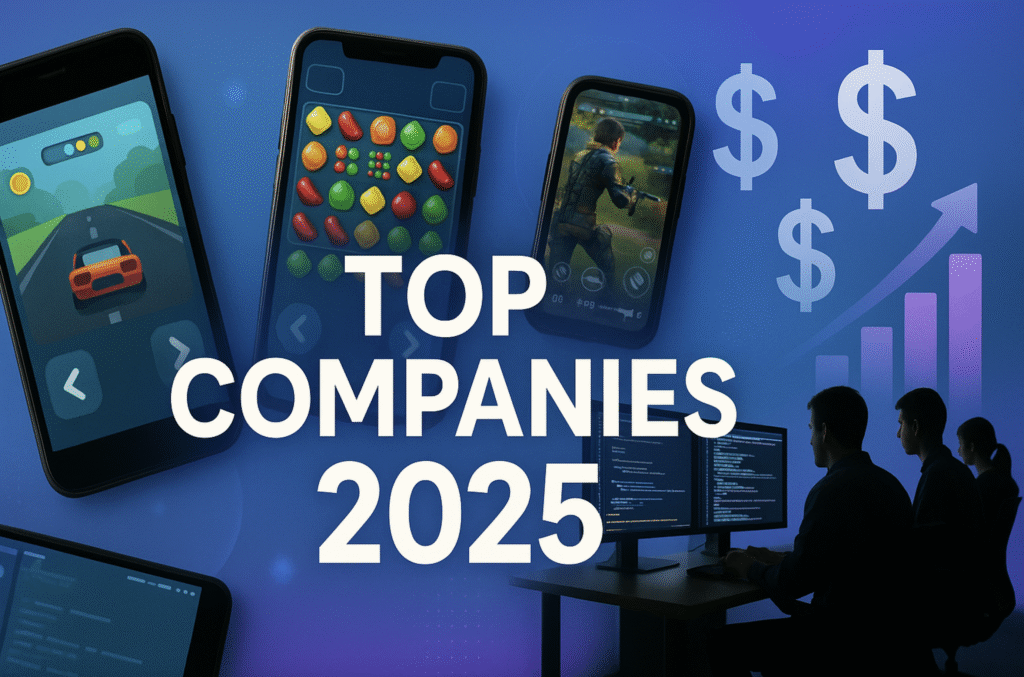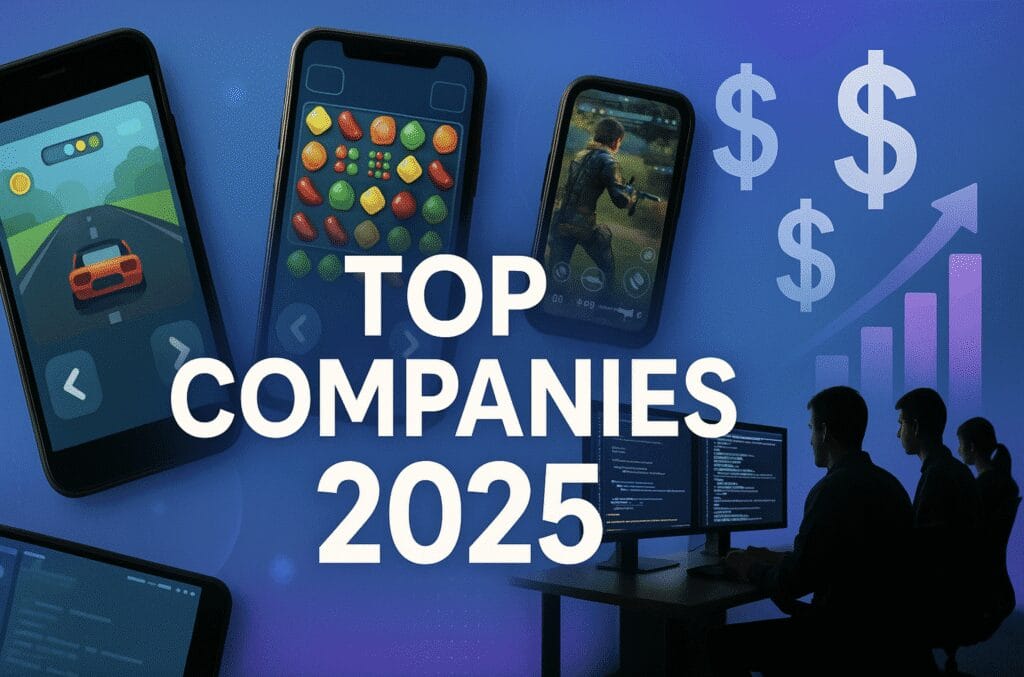Ever wondered why some mobile games become viral sensations while others disappear into the app store abyss? The secret isn’t just a great idea – it’s partnering with the right mobile game app development company that can transform your vision into a money-making reality.

Bottom Line Up Front: The mobile gaming industry is projected to hit $118.90 billion by 2027, but choosing the wrong development partner can cost you everything. From $10,000 simple games to $1 million AAA productions, the right mobile game app development companies can mean the difference between financial freedom and costly failure.
Why Mobile Game App Development Companies Are Your Ticket to Gaming Riches
The mobile gaming market isn’t just growing – it’s exploding. With over 3.4 billion mobile gamers worldwide and the industry generating over $105.70 billion in 2025, there’s never been a better time to get into mobile game development.
But here’s the catch: 91% of mobile games fail to generate significant revenue. The difference between the winners and losers? They partnered with experienced mobile game app development companies that understand both the technical challenges and the business side of gaming.
The Money-Making Potential That’s Getting Everyone’s Attention
Let’s talk numbers that should get your entrepreneurial blood pumping:
- Global mobile games market: Expected to reach $118.90 billion by 2027
- Average revenue per user: $47.52 in 2024, with premium games commanding much higher rates
- Successful indie games: Can generate $50,000 to $5 million in their first year
- Development ROI: Top-performing games see 300-500% returns on development investment
These aren’t just statistics – they represent real opportunities for anyone smart enough to partner with the right mobile game app development company.
Top Mobile Game App Development Companies That Actually Deliver Results
1. Unity-Based Powerhouses
Kevuru Games stands out as a versatile company specializing in mobile app development for iOS and Android. What makes them special? 100% client satisfaction rate and accurate cost estimates that actually stick to budget.
Their secret sauce: Professional communication and the ability to deliver projects on time. One client noted their “very accurate” cost estimates, which is rare in an industry known for budget overruns.
You’ll want to see this next…:Gaming-Friendly Coworking Spaces: The Perfect Blend of Work and Play
Key strengths:
- Transparent pricing system
- Advanced Unity and Unreal Engine expertise
- Cross-platform development efficiency
- Strong track record with indie developers
2. The Creative Storytellers
Whimsy Games Group has built a reputation for combining technical excellence with creative vision. They’ve achieved a 90% client retention rate and consistently deliver projects that see significant player engagement.
What sets them apart? They don’t just build games – they build experiences. One client reported a 30% increase in player retention thanks to their gamification features.
Why they’re worth considering:
- Focus on player psychology and engagement
- Strong project management capabilities
- Adaptable to changing requirements
- Proven track record with both casual and complex games
3. The Technical Innovators
GameCoder Studios brings serious technical firepower to the table. Based in Mexico, they’ve developed their own game engines and specialize in VR, AR, and traditional mobile platforms.
Their competitive advantage? They own their technology stack, which means faster development times and lower long-term costs for clients.
Technical specialties:
- Custom engine development
- VR/AR integration
- Cross-platform optimization
- Advanced graphics and physics
4. The Monetization Experts
HyperBeard Games has mastered the art of creating games that actually make money. Their mobile titles consistently rank in top download charts across multiple countries.
Their approach focuses on “striking and special aesthetics” combined with proven monetization strategies. They understand that beautiful games are worthless if they don’t generate revenue.
Revenue-focused features:
- Free-to-play optimization
- In-app purchase integration
- Ad monetization strategies
- Global market localization
What Separates Elite Mobile Game App Development Companies from the Rest
Technical Expertise That Actually Matters
The best mobile game app development companies don’t just know how to code – they understand the entire ecosystem:
Game Engine Mastery: Top companies are proficient in Unity, Unreal Engine, and emerging platforms like Godot. Unity powers over 50% of all mobile games, but the best developers know when to use alternatives.
Platform Optimization: iOS development typically costs 20% more than Android due to stricter guidelines, but elite companies streamline this process to save you money.
Backend Architecture: Successful multiplayer games require robust server infrastructure. The best companies design scalable backends from day one.
Business Intelligence That Drives Revenue
Technical skills are just the foundation. Elite mobile game app development companies also bring:
Monetization Strategy: Understanding of freemium models, in-app purchases, and ad integration that doesn’t destroy user experience.
Market Analysis: Knowledge of what’s working in your target demographic and how to position your game for maximum downloads.
Post-Launch Support: The real money comes after launch through updates, events, and community building.
How Much Should You Actually Expect to Pay?
Understanding mobile game development costs helps you budget realistically and avoid companies that lowball then hit you with hidden fees.
Budget-Friendly Options ($10,000 – $40,000)
Simple 2D games with basic mechanics can be developed for $10,000 to $40,000. Think puzzle games, basic platformers, or casual time-killers.
Examples: Crossy Road, simple match-3 games, basic endless runners
What you get: Core gameplay, basic graphics, essential monetization features
Mid-Range Productions ($40,000 – $120,000)
Feature-rich games with multiple levels, character progression, and social features typically cost $60,000 to $120,000.
Examples: Subway Surfer-style games, mid-core strategy games, multiplayer puzzle games
What you get: Advanced graphics, multiple game modes, robust monetization, social features
Premium Developments ($120,000 – $1,000,000+)
AAA mobile experiences with cutting-edge graphics, complex multiplayer systems, and ongoing content updates can cost $120,000 to over $1 million.
Examples: Mobile MOBAs, advanced RPGs, real-time strategy games
What you get: Console-quality graphics, complex systems, extensive post-launch support
Red Flags to Avoid When Choosing Mobile Game App Development Companies
The “Too Good to Be True” Pricing
If a quote seems unrealistically low, it probably is. Experienced developers know what quality work costs. Suspiciously cheap quotes often lead to:
- Hidden fees that emerge mid-development
- Rushed work that requires expensive fixes
- Developers who disappear when problems arise
- Games that barely function on launch
Lack of Portfolio Transparency
Legitimate mobile game app development companies showcase their work proudly. Warning signs include:
- Vague project descriptions without specifics
- No playable demos or download links
- Claims about “confidential projects” they can’t show
- Portfolio filled with outdated or simple projects
Poor Communication During Initial Consultations
If they can’t communicate clearly during the sales process, they won’t improve during development. Red flags:
- Delayed responses to basic questions
- Inability to explain technical concepts simply
- Pressure to sign contracts without proper consultation
- Unwillingness to provide detailed project timelines
How to Maximize Your Return on Investment
Start with a Minimum Viable Product (MVP)
Smart entrepreneurs test their game concept with a basic version before investing in full development. MVP benefits:
- Validate your game concept with real users
- Identify monetization opportunities early
- Reduce development risk and cost
- Create buzz and pre-launch interest
Focus on Monetization from Day One
The most successful mobile games are designed around revenue generation, not as an afterthought. Key strategies:
Freemium Model: Free download with premium features or content In-App Purchases: Virtual currency, cosmetics, power-ups Ad Integration: Rewarded videos and banner ads that enhance rather than interrupt gameplay Subscription Services: Premium memberships for ongoing content
Plan for Post-Launch Success
The real money in mobile gaming comes from ongoing engagement. Essential post-launch elements:
- Regular content updates
- Seasonal events and challenges
- Community building and social features
- Data-driven optimization based on player behavior
Emerging Trends That Smart Developers Are Capitalizing On
AI-Powered Personalization
The best mobile game app development companies are integrating AI to create personalized gaming experiences. AI applications include:
- Dynamic difficulty adjustment
- Personalized content recommendations
- Predictive monetization targeting
- Automated customer service
Cross-Platform Integration
Modern games aren’t just mobile experiences – they’re part of larger ecosystems. Trend opportunities:
- Mobile-to-PC progression systems
- Social media integration
- Streaming platform compatibility
- NFT and blockchain integration
Hyper-Casual Evolution
The hyper-casual market is evolving into “hybrid casual” games that combine simple mechanics with deeper progression systems. Market opportunities:
- Longer player retention
- Higher revenue per user
- Broader demographic appeal
- More sustainable business models
Your Action Plan for Mobile Game Success
Step 1: Define Your Vision and Budget
Before contacting any mobile game app development companies:
- Game Concept: Write a one-page game description
- Target Audience: Define your ideal player demographic
- Monetization Strategy: Decide how you’ll make money
- Budget Range: Set realistic financial expectations
Step 2: Research and Shortlist Companies
Use these criteria to narrow your options:
- Portfolio Alignment: Previous games similar to your vision
- Technical Expertise: Relevant platform and engine experience
- Client Reviews: Verified testimonials and case studies
- Communication Style: Responsive and clear interactions
Step 3: Request Detailed Proposals
Ask for comprehensive proposals that include:
- Detailed Timeline: Milestone-based development schedule
- Cost Breakdown: Transparent pricing for each development phase
- Team Composition: Specific roles and experience levels
- Post-Launch Support: Ongoing maintenance and update plans
Step 4: Start Small and Scale Smart
Begin with an MVP or prototype to:
- Test your concept with real users
- Establish a working relationship with your chosen company
- Gather data for future development decisions
- Build momentum for larger investment rounds
The Bottom Line on Mobile Game App Development Companies
The mobile gaming industry offers unprecedented opportunities for financial success, but only for those who approach it strategically. The difference between games that generate life-changing income and those that drain your bank account often comes down to one critical decision: choosing the right mobile game app development company.
The winners understand three key principles:
- Quality development costs money, but cheap development costs more
- Revenue planning starts before coding begins, not after launch
- Post-launch success requires ongoing partnership, not just a one-time transaction
The mobile gaming gold rush is happening right now. The question isn’t whether there’s money to be made – it’s whether you’ll position yourself to capture your share of this $118.90 billion market.
Frequently Asked Questions
How much does it cost to hire a mobile game app development company?
Mobile game development costs range from $10,000 for simple 2D games to over $1 million for complex AAA titles. Most successful indie games fall in the $40,000-$120,000 range. The key is matching your budget to your revenue expectations and starting with an MVP to test market demand.
What should I look for when choosing mobile game app development companies?
Focus on portfolio quality over price. Look for companies with proven experience in your game genre, transparent communication, detailed project proposals, and post-launch support capabilities. Client testimonials and verifiable success stories are more valuable than marketing promises.
How long does mobile game development typically take?
Development timelines vary based on complexity. Simple games can be completed in 2-4 months, while feature-rich games may take 6-12 months or longer. The best companies provide milestone-based timelines with regular progress updates and flexible adjustment capabilities.
Can small companies compete with major studios in mobile gaming?
Absolutely. The mobile gaming market rewards innovation and player engagement over production budgets. Many successful indie games were created by small teams with focused vision and smart monetization strategies. The key is finding your niche and executing exceptionally well.
Must read: The Ultimate Digital Nomad Gaming Setup Guide: Turn Your Passion Into Profit While Traveling
What’s the difference between hiring freelancers versus mobile game app development companies?
Companies offer comprehensive teams, project management, and ongoing support, while freelancers may be more cost-effective for simple projects. For commercial games intended to generate significant revenue, established companies typically provide better results due to their experience, resources, and accountability structures.
Ready to turn your game idea into a revenue-generating reality? Share your game concept in the comments below or tell us about your experience working with mobile game development companies!




Pingback: nft lawyer
Pingback: World Series of Poker App Codes: Get Free Chips Instantly in 2025 - Wow-Free-Games
Pingback: Most Popular Games on Play Store: 2025 Market Analysis and Trending Insights - Wow-Free-Games